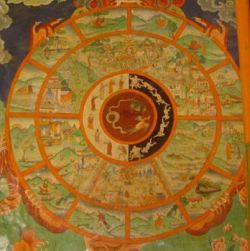6. You Are What You Do: Karma
The origins of the idea of karma, its moral significance in the Upanisads, and an alternative conception in the Bhagavad-Gita.
Themes:
• J. Bronkhorst, Karma (Hawaii: 2011).
• W. Doniger O’Flaherty (ed.), Karma and Rebirth in Classical Indian Traditions (Berkeley: 1980).
• C. Framarin, “Good and bad desires: Implications of the dialogue between Kṛṣṇa and Arjuna,” International Journal of Hindu Studies 11 (2007), 147–170.
• Y. Krishnan, The Doctrine of Karma: its Origin and Development in Brahmanical, Buddhist and Kaina Traditions (Delhi: 1997).
• B.K. Matilal, “The notion of karma”, in B.K. Matilal, Logic, Language and Reality (New Delhi: 1985), 361-71.
• B.K. Matilal, “Karma and the Moral Order,” in B.K. Matilal, Ethics and Epics (Delhi: 2002), chapter 28.
• S. Srikumar, “An Analysis of Consequentialism and Deontology in the Normative Ethics of the Bhagavadgītā,” Journal of Indian Philosophy 40 (2012), 277–315.

Origins


 ..
..



Comments
Religion and Philosophy in the Eastern Tradition
A very interesting podcast. Thinking on the Bhagavad Gita, was it not Krishna’a devotional argument that ultimately swayed Arjuna, not the metaphysical argument as to action without attachment or that related to duty based on caste. The themes of religion and philosophy are clearly deeply intertwined and not so clearly separated as in the west? Do you think religion and philosophy can be so neatly separated in the Indian tradition and if so, where is the dividing line?
In reply to Religion and Philosophy in the Eastern Tradition by Jaime Valles
Philosophy vs religion
That's definitely a tricky question, and has already been a recurring theme. I actually don't think that the two are easy to disentangle in the "western" tradition either - as we're seeing in the Latin medieval episodes at the moment. Actually I am not particularly inclined to try to disentangle them, either. I think of religion as one of the most important factors - but there are others - that set the context for doing philosophy. Religion provides an impulse for tackling certain philosophical topics in certain ways, rather than being somehow antithetical or exclusive of philosophy. I think of it as being more like other contextual factors, like e.g. social beliefs concerning class, slavery, gender, etc.
Having said that there is perhaps a difference in India in that some of the texts we're talking about are actually religious texts (in some sense), the Upanisads for instance. That hasn't usually been true of the texts I looked at in Europe, though for instance Plato's dialogues were seen that way by some Platonists. We talk about this in the next episode, the interview with Brian Black.
In reply to Philosophy vs religion by Peter Adamson
Thanks Peter it's a really
Thanks Peter it's a really great series. I have always interested in this relationship between dharma/ adharma and Kharma. Khrishna says he comes into the world to punish adharma. This carries with it a concept of right action, though, within the Hindu tradition this seems to have a highly nuanced meaning! Krishna’s conduct at Kuruksetra has consequences not even he can avoid. Clearly, at the time of the Mahabharata, there is a transition in Hindu thought which you touched upon, to deal with the aestheticism of the Buddhists and Jainism on one hand and to underpin the emerging dominance of the Kshatriya warrior elite, on the other. The latter being at the expense of the traditional Brahmin/Vedic tradition. I really look forward to your future podcasts exploring these themes.
In reply to Religion and Philosophy in the Eastern Tradition by Jaime Valles
I am totally unqualified to
I am totally unqualified to comment on this, but I guess, this separation might be more apparent in the dissenting schools which challenged the Vedic worldview, like say Lokayatas, Charvaks, or even Buddhist texts. Also, regarding Gita : Since the Mahabharata text was compiled over a period of centuries, with countless retellings, revisions, so it might be possible that the religious overtones are a product of a later phase of Vaishnavism.
In any case, I am not very sure whether we had such neat categories of 'religion' and 'philosophy' separate from one other, either in ancient India or Greece. Also, since 'Hinduism' is really just an umbrella term and really didn't exist as a 'religion' (as we understand the term today) in those days, so it adds another complexity to the tale.
Indian Philosophy Podcast Music
Hello,
Sorry for the irrelevant question, what is the music played at the beginning and end of each Indian Philosophy Podcast? Maybe it is already mentioned somewhere, but I missed it.
In reply to Indian Philosophy Podcast Music by Tadas
India music clip
Oh sorry, I usually add the clips on the Links page but forgot in this case. It is from Wikipedia Commons:
https://commons.wikimedia.org/wiki/File:Jana_Hai_Dilli_Re.ogg
In reply to India music clip by Peter Adamson
The real source is probably different
Incidentally, it appears (just my impression) from the full clip on Wikipedia Commons that the flute part you use in the podcast is being used in the song too in the same manner: it is not something composed for the purpose of that song, but something they borrowed/reused from somewhere else. So I guess the true origin remains a mystery.
The Buddhist tradition that I
The Buddhist tradition that I grew up with has a different (or at least additional) solution to the problem of squaring karma with genuine altruisim: Karma acts through the state of mind. Indeed one's karma is nothing more than the chain of causality within the individual.
Buddhists beleive, somehow, that this causal chain skips from body to body. Given that, it's reasonable to think that the kind of body you are reborn with correlates with your state at death. In this view, nurturing an altruistic spirit within yourself will yield better results than just doing external good deeds out of a selfishly transactional view of karma.
Migration from the Indus?
Thanks for this great series of talks! I am quite familiar with the topic, and you give me a site to refer people to for a easily acquired familiarity with the though of India. Because I am familiar with the topic, if find many points of disagreement, but only one outside the range of academic debate:
After a good account of the Indus Civilization that predates the entry of the Aryans into India, you state in the podcast on Karma (at 3:45) that the Aryans moved from "their homeland along the Indus river" into the Ganges valley. A minor slip of the mind, I know, but nowhere do you explicitly state that the Indo-European speaking Aryans migrated from the Causacus region throught the Khyber Pass into the Punjan and east following the Ganges. This makes sense of the relationship between Sanskrit and the other Indo-European languages of Greek, Latin, Persian, etc., whereas their migration from an area whose language source is unknown and script undeciphered is confusing.
Ajivikas
I find the ajivika position a little hard to figure out. To me, whether there's no karma because everything is arbitrarily fated, or whether there's no karma because the soul dissolves at death, it seems like the practical upshot should be the same. The Charvaka logic makes more sense to me, and it seems like it could apply given ajivika beliefs as well. I could understand, on these assumptions, an "Epicurean" emphasis on calming desire and living simply to minimize pain, but it seems like ajivika asceticism went beyond that, and I find it hard to imagine what the benefit of intense asceticism is if you're going to be reincarnated the same number of times no matter what.
As an aside, I was interested to find that the Charvaka school seems to have been re-founded in modern India. I found a news article about a "Charvaka ashram" that was founded in 1973 https://www.thenewsminute.com/article/heart-andhra-s-booming-capital-lies-quaint-ashram-rationalists-100193
In reply to Ajivikas by Ryan W
Ajivakas
Yes their position is hard to reconstruct, in part because of lacking evidence. But if I understood it right, their point is not so much about finding the optimal strategy, so to speak, but about living in a way that makes intrinsic sense. Their reason for asceticism, as explained later in the episode, was not necessarily trying to escape the karmic cycle (as you say they think it just goes on for a predetermined number of rounds) but to acknowledge the futility of action and engagement with the world. On the other hand I seem to remember there was also a sense that in Ajivakism the total ascetic would be displaying that they are indeed almost ready to end the many cycles - even though they are not affecting that by being ascetic. Maybe comparable to a Calvinist trying to be virtuous, to show themselves and others that they are among the saved, even though they know this has already been predestined in advance.
karma in the Gita
You have described a belief in karma as a belief in acting well so as to enhance one's own, and only one's own, personal rebirth. Described in this way "acting well" appears as a selfish act devoid of true altruism. But is not acting well intrinsic to any action that enhances both the well being and karma of others? I would think that any actions that enhances one's own karma cannot be anything other than actions identical to elevating the karma of all. By definition.
A crude example might be giving alms to the poor. Yes, perhaps we "selfishly" thinking that it will pay off in a next life. But the same act of giving must by some measure be effectively altruistic in that it allows others the possibility not only of making their life better and thereby making another person's rebirth better.
I don't see how it is possible that a good act can knowingly hurt another person.
In reply to karma in the Gita by hydr
Karma
Yes good point. Actually the issue you're raising here affects nearly all ancient ethical theories (also Greek, one exception would be the Mohist Chinese school) since these tend to be "eudaimonist" i.e. focused on the happiness/welfare/flourishing of the individual agent. Such theories have the advantage of built in motivation - since everyone wants to be happy or flourish - but struggle to explain altruistic behavior. Still they usually find the way. The Gita is a good example since it argues for "unattached action" (not unlike Buddhism) and acting in such a way as to keep the order of the worls running, in devotion to god. So there, we have what is still a eudaimonist approach where the individual's welfare is seen in a larger perspective and in terms of the goodness of the whole cosmos.
Add new comment